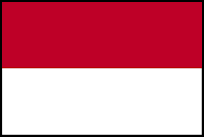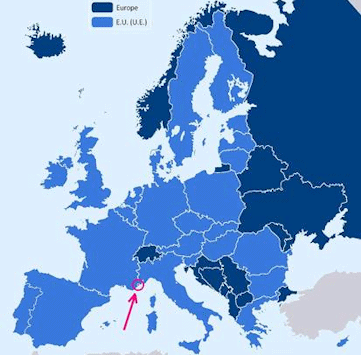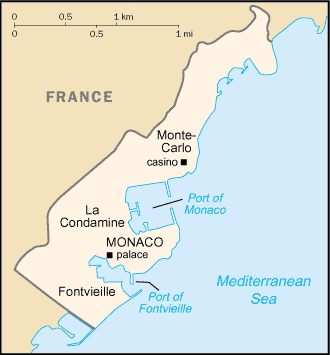Principality of Monaco
 Monaco, officially the Principality of Monaco is an independent and sovereign country located on the northern coast of the Mediterranean Sea. It is surrounded on land by its neighbor France, and Italy’s borders are just 10 miles away (about 16km).
Monaco, officially the Principality of Monaco is an independent and sovereign country located on the northern coast of the Mediterranean Sea. It is surrounded on land by its neighbor France, and Italy’s borders are just 10 miles away (about 16km).
Its area is 0.76mi² (1.98 km²) with a population of almost 36,000 inhabitants among which 8,300 Monegasques and including residents from 125 nationalities. Monaco is the second smallest country in the world and the smallest member of the United Nations. Furthermore The City-State of Monaco is the world’s most densely populated country: 23.800 inhabitants/mi².
The house of Grimaldi has ruled over Monaco since 1297. Monaco’s sovereignty was officially and permanently recognized by the Franco/Monegasque Treaty of 1861. Furthermore, Monaco is one of 5 European micro-States (the others being: Andorra, Liechtenstein, Malta, and the Vatican City). The Principality of Monaco is the second-smallest independent state in the world, after the Holy See (Vatican City).
Monaco is divided into four sections: Monaco-Ville, the old city on a rocky promontory extending into the Mediterranean; La Condamine, the section along the port; Monte-Carlo, the principal residential and resort area; and Fontvieille, a newly constructed area reclaimed from the sea.
Monaco has no regular military forces; the Palace Guard performs ceremonial duties. Monaco actively participates in the United Nations, which it joined in 1993. Monaco joined the Council of Europe on October 4, 2004. Monaco also is a member of many international and intergovernmental organizations, including Interpol, the UN Educational, Scientific, and Cultural Organization (UNESCO), and the World Health Organization (WHO). The International Hydrographic Bureau (IHB) is headquartered in Monaco.
The Principality of Monaco is a sovereign and independent state, linked closely to France by the Treaty of July 1918, which was formally noted in Article 436 of the Treaty of Versailles of 1919. The foreign policy of Monaco is one illustration of this accord: France has agreed to defend the independence and sovereignty of Monaco, while the Monegasque Government has agreed to exercise its sovereign rights in conformity with French interests. Since then, the relations between the sovereign states of France and Monaco have been further defined in the Treaty of 1945 and the Agreement of 1963.
Although not a member of the European Union (EU), Monaco is closely associated with the economic apparatus of the EU through its customs union with France and its reliance upon the euro as its official currency. Monaco has 10 diplomatic missions in Western Europe and permanent representation at the United Nations and the Council of Europe. It maintains honorary consulates in 106 cities in 45 countries. Seventy-six countries have ambassadors, consulates general, consulates, or honorary consulates in or accredited to Monaco. The principality is noted for its beautiful natural scenery and mild, sunny climate. The average minimum temperature in January and February is 8oC (47oF); in July and August the average maximum temperature is 26oC (78oF). In July 2009, Monaco's population was estimated at 32,965, with an estimated average growth rate for 2009 of 0.394%. French is the official language; English, Italian, and Monegasque (a blend of French and Italian) also are spoken. The literacy rate is 99%. Roman Catholicism is the official religion, with freedom of other religions guaranteed by the constitution.
In 1997, the Principality of Monaco celebrated the 700 year reign of the Grimaldi dynasty. It all began on January 8, 1297 when the Guelf François Grimaldi dressed as a Franciscan monk, seized the fortress protecting the famous rock of Monaco and the port of Hercules. Surmounting the trials and tribulations of history and throughout the dark periods of foreign domination, the Principality has managed to affirm its identity and preserve its independence throughout the centuries due to the wise guidance of its Princes.
The Grimaldi dynasty has bequeathed Lords and then Princes to the Principality, illustrious in their many domains, who wrote the most enticing pages in the history of Monaco. To cite but a few: Rainier I, General Admiral of France; Honore II, the first Prince of Monaco at the origins of the most important treaties with France; Louis I, Ambassador to the Holy See under Louis XIV; Antoine I, grand patron of the arts; Charles III, founder of Monte-Carlo; Albert I, renowned as the father of oceanography; Louis II, the soldier Prince.
Founded in 1215 as a colony of Genoa, Monaco has been ruled by the House of Grimaldi since 1297, except when under French control from 1789 to 1814. Designated as a protectorate of Sardinia from 1815 until 1860 by the Treaty of Vienna, Monaco's sovereignty was recognized by the Franco-Monegasque Treaty of 1861. The Prince of Monaco was an absolute ruler until a constitution was promulgated in 1911. In July 1918, a treaty was signed providing for limited French protection over Monaco. The treaty, formally noted in the Treaty of Versailles, established that Monegasque policy would be aligned with French political, military, and economic interests.
A new constitution, proclaimed in 1962, abolished capital punishment, provided for female suffrage, and established a Supreme Court to guarantee fundamental liberties. In 1993, Monaco became an official member of the United Nations with full voting rights. It joined the Council of Europe in 2004. Three months after the death of his father, Prince Rainier III, on April 6, Prince Albert II formally acceded to the throne on July 12, 2005.


|
NEWSLETTER
|
| Join the GlobalSecurity.org mailing list |
|
|
|

